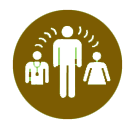Shoulder Replacement
Shoulder Replacement
What is Shoulder Replacement?
Shoulder replacement is a surgical procedure in which a shoulder joint is replaced with an artificial shoulder joint.
Shoulder replacement is performed in cases where the shoulder joint is severely damaged by arthritis or physical injury, and medication and lifestyle adjustments have failed to treat the pain and mobility restrictions caused by the damaged shoulder joint.
How is Shoulder Replacement Surgery Performed?
- An anterior incision is made on the shoulder.
- The nerves, muscles, and blood vessels are moved to one side.
- The joint capsule of the shoulder joint is cut, which allows the surgeon to view the joint.
- The ball of the humeral head is removed using a bone saw.
- The hollow inside the humerus is scraped and space is made to attach the metal stem of the humeral component.
- A tool known as burr is used to grind any cartilage from the surface if the glenoid needs to be replaced.
- Holes are drilled into the scapula where the stem of the glenoid component is attached.
- The humeral and glenoid components are then placed in and the humeral ball is attached.
- After the joint is anchored, it is checked to see if it has been properly attached.
- The surgeon stitches the joint capsule together.
- The nerves, muscles, and blood vessels are moved back in their original place.
- The incision is closed with stitches and covered with a bandage.
The Artificial Shoulder Joint
The shoulder joint implants are of two kinds:
- Cemented
The cemented implant is fixed in place by a kind of epoxy cement that joins the metal to the bone. - Un-cemented
The un-cemented implant consists of a net of holes on its exterior, and the bone grows into the net. Eventually, the implant is joined to the bone.
The artificial implant consists of two parts:
- The Humeral Components
The humeral head, which is the ball of the joint, is replaced by the humeral component. It is made up of metal. - The Glenoid Component
The socket of the joint, which is part of the scapula, is replaced by the glenoid component. It consists of two parts: the socket that is made up of a tough and smooth plastic cup, and a metal tray that is attached to the bone.
How to Prepare for Shoulder Replacement?
- The patient is physically examined to ensure that the patient is in a good condition to undergo surgery.
- The patient is required to give several tests like blood and urine test, x-rays and cardiogram.
- The doctor should be informed about any medication that the patient is taking with or without a prescription. These may include supplements or herbs or drugs.
- Certain medication that the patient is taking may be stopped two weeks before the surgery.
- The doctor should be informed if the patient has any ailments or medical conditions.
- The doctor should be informed if the patient has been drinking more than 2 drinks of alcohol per day.
- The patient must stop smoking to ensure a quick recovery.
What are the tests required?
The tests required before the procedure is X- rays.
How much time is required?
The procedure takes about 2 hours whereas the hospital stay would be around 1- days. The patient needs to stay in India for about 2-4 weeks.
What is the cost of the procedure?
The cost of replacing one shoulder is 6000-7000 USD and the replacement of both the shoulder is 10,000-11,000 USD.
What type of anesthesia will be given?
General of Regional Anesthesia
How will patient recover?
- The patient's shoulder may be strapped to a continuous passive motion (CPM) machine, which helps in reducing stiffness of the joint and easing pain.
- A drainage tube may be used to drain excess fluid after the surgery.
- A sling is used to hold the patient's arm at rest. This should be worn at night for 4 to 6 weeks.
- The patient will be able to perform light activities like eating and grooming within a couple of weeks after the surgery.
- The patient will be able to drive a car within 6 weeks after the surgery.
- The patient is required to undergo a rehabilitation program starting on the day after the surgery.
- The patient may take 6 months to 1 year to fully recover.
What should be cared?
- The patient is required to continue the rehabilitation program for many months. A physical therapist will help the patient with some exercises that will improve the shoulder's strength and stability.
- The patient needs to visit the doctor at intervals of 6 weeks for 5 to 6 months during which the doctor will monitor the patient's progress.
- The patient is required to take antibiotics after any surgical or invasive procedures to prevent infection. This includes dental procedures.
The doctor should be informed immediately if the following symptoms occur:
- High fever
- Excessive drainage from the incision wound.
- Redness and swelling at the incision area
- Severe pain
 +91-9599966306
+91-9599966306









